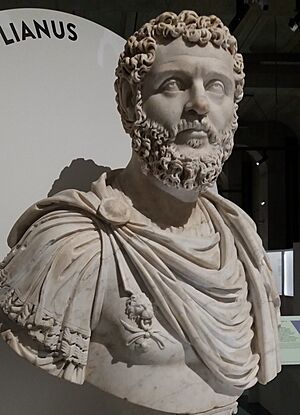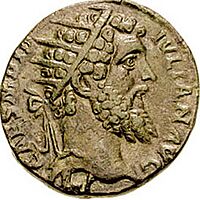Didius Julianus facts for kids
Quick facts for kids Didius Julianus |
|||||||||
|---|---|---|---|---|---|---|---|---|---|

Modern replica of an ancient bust in the Capitoline Museums
|
|||||||||
| Roman emperor | |||||||||
| Reign | 28 March – 2 June 193 | ||||||||
| Predecessor | Pertinax | ||||||||
| Successor | Septimius Severus | ||||||||
| Born | 29 January 133 Mediolanum, Italy |
||||||||
| Died | 2 June 193 (aged 60) Rome, Italy |
||||||||
| Spouse | Manlia Scantilla | ||||||||
| Issue | Didia Clara | ||||||||
|
|||||||||
| Father | Quintus Petronius Didius Severus | ||||||||
| Mother | Aemilia Clara | ||||||||
Marcus Didius Julianus (born January 29, 133 – died June 2, 193) was a Roman emperor for a short time in 193 AD. This year is known as the Year of the Five Emperors because five different people claimed to be emperor. Julianus had a successful career in the Roman government before becoming emperor. He was a governor in several Roman provinces, like Dalmatia and Germania Inferior. He even helped defeat two invading tribes, the Chauci and Chatti.
Julianus became emperor by buying the position from the Praetorian Guard. These were the emperor's personal bodyguards, and they had just killed the previous emperor, Pertinax. After Julianus bought the throne, a civil war started. Three powerful generals also wanted to be emperor. Septimius Severus, one of these generals, marched his army towards Rome. Julianus was soon abandoned by the Roman Senate and the Praetorian Guard. A soldier then killed Julianus in the palace, and Severus became the new emperor.
Contents
Who Was Didius Julianus?
His Family and Early Life
Didius Julianus was born on January 29, 133 AD. His father, Quintus Petronius Didius Severus, came from an important family in Mediolanum (which is now Milan, Italy). His mother, Aemilia Clara, was from North Africa and also from a respected Roman family.
When he was young, Julianus was raised by Domitia Calvilla. She was the mother of the famous emperor Marcus Aurelius. With her help, Julianus started his career in public service very early. He married a Roman woman named Manlia Scantilla. Around 153 AD, they had their only child, a daughter named Didia Clara.
His Career in Roman Government
Julianus held many important jobs in the Roman government. He started as a quaestor and then an aedile. Around 162 AD, he became a praetor, which was a high-ranking judge. He was also put in charge of a Roman legion (a large army unit) in a place called Mogontiacum (modern-day Mainz).
In 170 AD, he became the governor of Gallia Belgica for five years. He successfully defended the area from the Chauci tribe. Because of his success, he was made a consul in 175 AD, which was a very high honor. He served alongside Pertinax, who would later become emperor. Julianus also fought against the Chatti tribe and governed other provinces like Dalmatia and Germania Inferior.
Later, he was given a job to distribute money to the poor in Italy. Some historians believe this was a way to reduce his power. At one point, he was accused of plotting against Emperor Commodus, but he was found innocent. After that, he governed Bithynia and then North Africa.
How Did He Become Emperor?
Buying the Throne
After Emperor Pertinax was killed on March 28, 193 AD, the Praetorian Guard made a shocking announcement. They said they would sell the throne to the person who offered the most money! Titus Flavius Claudius Sulpicianus, a high-ranking official in Rome, began to offer money for the throne.
Meanwhile, Didius Julianus also arrived at the Praetorian Guard's camp. Since he couldn't get inside, he shouted his offers to the guards. After hours of bidding, Sulpicianus offered 20,000 sesterces (a type of Roman coin) to each soldier. Julianus, worried he would lose, then offered even more: 25,000 sesterces per soldier! The guards accepted Julianus's offer, opened the gates, and declared him emperor. The Roman Senate, pressured by the military, also had to accept him as emperor. His wife and daughter were given the special title of Augusta.
What Happened During His Reign?
An Unpopular Emperor
When Julianus became emperor, he immediately changed the value of Roman money. He reduced the amount of silver in the denarius coin. This made the money worth less.
Because Julianus bought his position, he was very unpopular with the Roman people. When he appeared in public, people would often groan and shout insults at him. Once, a crowd even threw large stones at him as he tried to go to the Capitoline Hill.
News of this anger spread across the Roman Empire. Three powerful generals, Pescennius Niger in Syria, Septimius Severus in Pannonia, and Clodius Albinus in Britain, decided to rebel. Each of them had a large army and declared himself emperor.
Julianus declared Severus a public enemy because he was the closest general to Rome and therefore the most dangerous. Julianus sent senators to try and convince Severus's soldiers to leave him. He also nominated a new general to replace Severus and even sent a soldier to try and kill him.
The March of Severus
The Praetorian Guard, who were Julianus's main support, were not used to fighting in big battles. Julianus tried to train them, but they were still not as strong as Severus's experienced soldiers.
Severus first made a deal with Albinus, promising him a high title. Then, Severus quickly captured the city of Ravenna and its fleet of ships. He also defeated a Praetorian prefect (a high-ranking officer) sent to stop him. Many of the Praetorian Guard simply left Julianus and joined Severus.
Julianus tried to negotiate with Severus, even offering to share the empire with him. But Severus ignored these offers and kept marching towards Rome. As he got closer, more and more cities in Italy supported him. The remaining Praetorian Guard members were pardoned by Severus in exchange for handing over the soldiers who had killed Pertinax.
The Roman Senate then declared Severus emperor. They also honored Pertinax, the previous emperor, and sentenced Julianus to death. Julianus was abandoned by almost everyone, except for one of his officers and his son-in-law.
How Did Didius Julianus Die?
Didius Julianus was killed in the palace by a soldier on June 2, 193 AD. He had been emperor for only 66 days. According to a Roman historian named Cassius Dio, Julianus's last words were: "But what evil have I done? Whom have I killed?"
His body was given to his wife and daughter, who buried him in his great-grandfather's tomb. The Senate also passed a special motion called damnatio memoriae. This meant they wanted to erase his memory and condemn his legacy. Severus then dismissed the Praetorian Guard and punished the soldiers who had killed Pertinax.
What Was His Legacy?
During his time as a general, Julianus helped protect Rome's borders by fighting off the Chatti and Chauci tribes. These tribes were early signs of larger groups that would later challenge the Roman Empire.
As emperor, Didius Julianus didn't have time to make many big changes, except for changing the value of the currency. While his change was small, it restarted a trend of reducing the silver content in Roman coins. This trend continued after him and led to economic problems like inflation. His open purchase of the throne also showed that the Roman Empire was facing serious challenges and was no longer as stable as it once seemed.
See also
 In Spanish: Didio Juliano para niños
In Spanish: Didio Juliano para niños
 | Shirley Ann Jackson |
 | Garett Morgan |
 | J. Ernest Wilkins Jr. |
 | Elijah McCoy |


